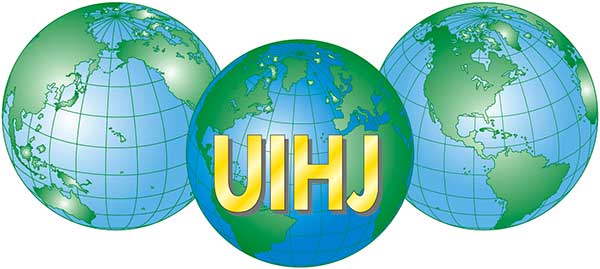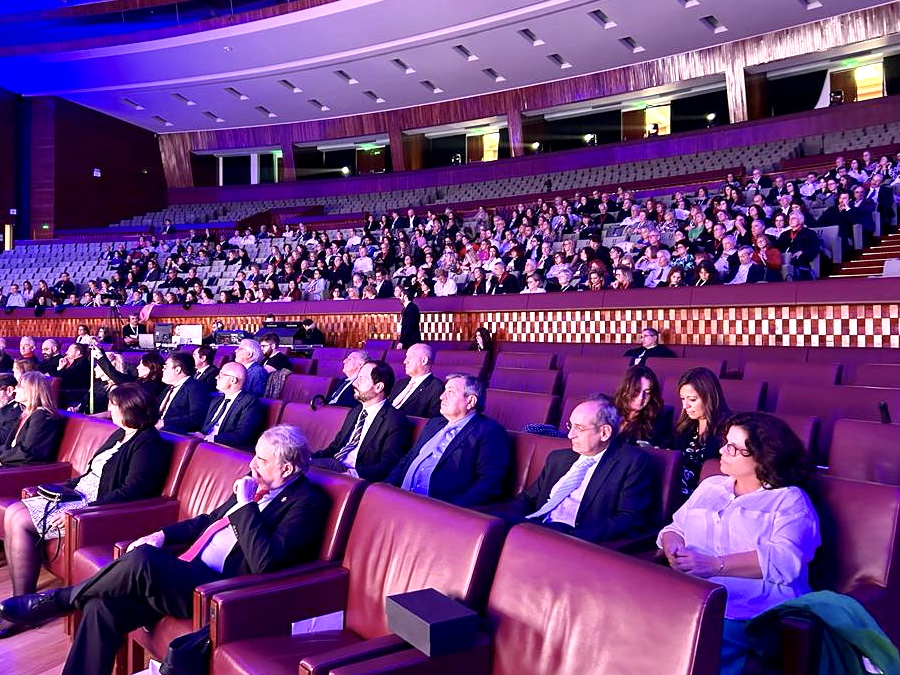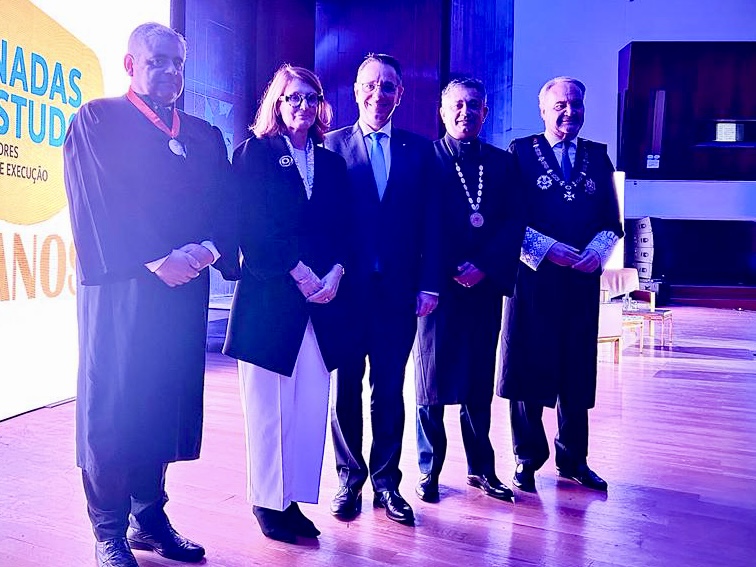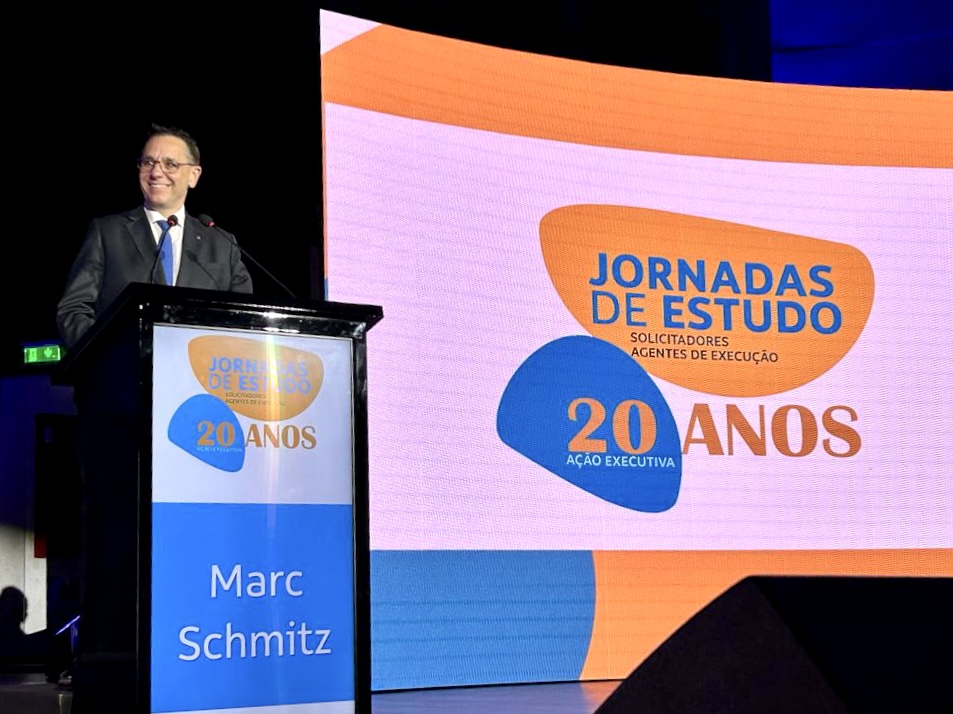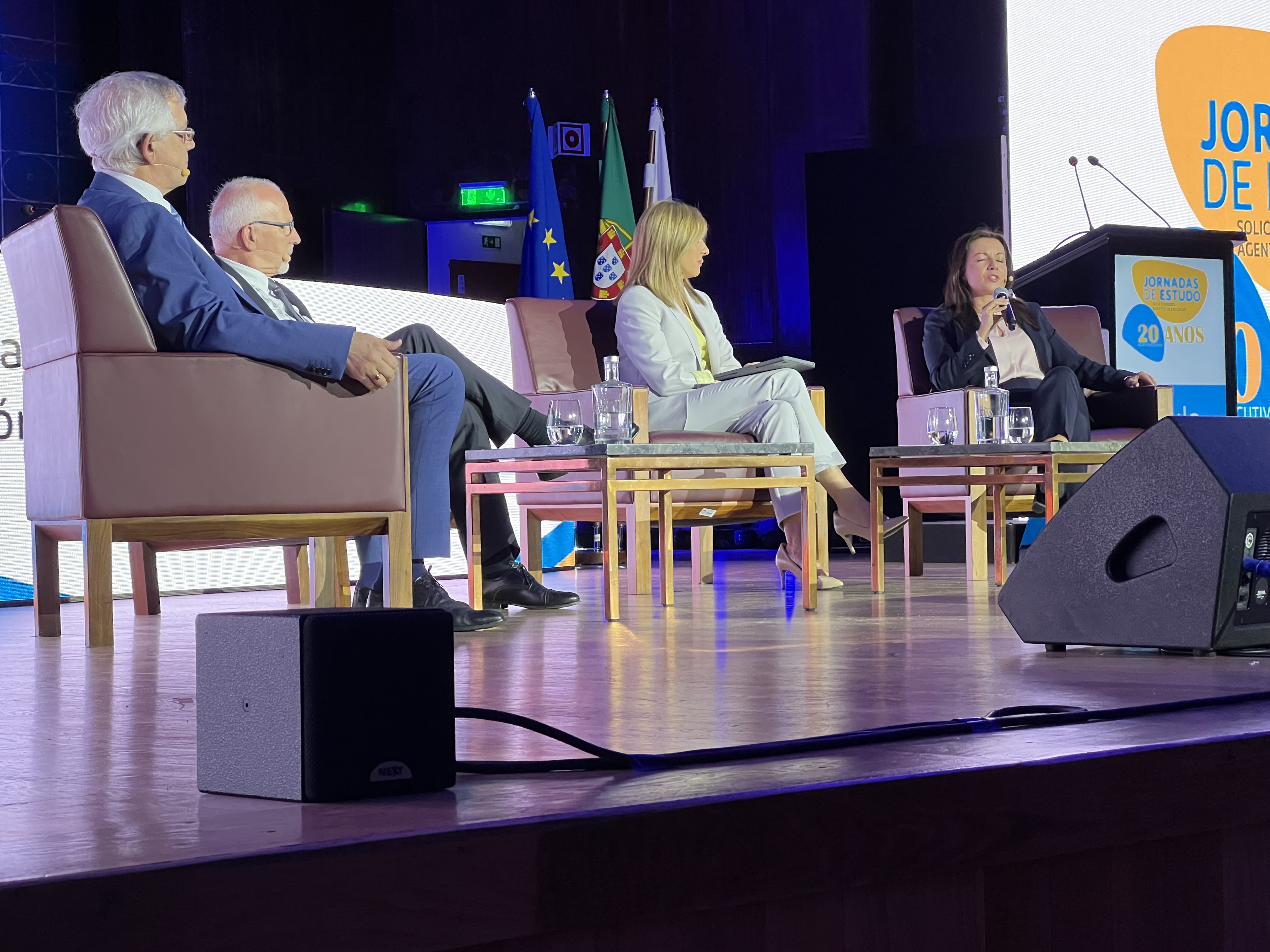The doors of the Aula Magna, at the University of Lisbon, opened from 25th till 27th October 2023 to host another edition of the Study Days for Solicitors and Enforcement Agents. But 2023 also brought the Celebration of the 20th anniversary of the Executive Action Reform and this was the beginning of another event that promises to remain in the memory of those who pass by, and in the History of the House that promotes it. The first that has the high patronage of His Excellency the President of the Republic, Marcelo Rebelo de Sousa.
In front of an audience of more than 500 people, the solemn ceremony began and was chaired by the Minister of Justice, Catarina Sarmento e Castro, this session was opened by Duarte Pinto, President of the Professional Council of the College of Execution Agents, and also included the participation of Paulo Teixeira, President of OSAE, Juan Carlos Estévez, President of the Consejo General de Procuratores de España, and Marc Schmitz, President of the Union Internationale des Huissiers de Justice.
Thus, beyond cross-border perspectives, there were many stories and people remembered around a reform that changed Justice in Portugal and that posed a great challenge to the then Chamber of Solicitors and its associates.
According to Duarte Pinto, “Portuguese economic justice – in its operationality – is far ahead of most of its global counterparts and any study of comparative executive law will easily reach this conclusion. The future is the moment that comes next and we have to believe that we are prepared for it. The guardianship must know that it can always continue to trust in us and in everything we know how to do best, that we can continue to move forward together with the firm purpose of achieving more effective, fair and speedy justice, always counting on the indispensable factor human that the Enforcement Agents represent”.
Along this path, Marc Schmitz recalled the great moments and milestones that were part of this shared journey and in which cooperation made all the difference. Memories corroborated by Juan Carlos Estévez, who also highlighted how the participation of the Minister of Justice reveals the importance of the institution and its associates. In both cases and finally, the desire to continue strengthening these institutional ties was clear.
During his speech, the President highlighted the people who were behind this reform, namely the previous President, José Carlos Resende. A moment marked by the sound of applause, which was followed by a reference to the impact of the reform in various fields, highlighting “the return of billions of euros to the economy; the reduction in the reservations placed on investors and the increase in confidence due to the greater certainty of swift reimbursement of their corresponding credit rights; the recovery of confidence indices on the part of the ‘justiciable’ due to the effective recovery of the claims of enforcers and the effective contribution to the gradual disappearance of the collective awareness of impunity generated by procedural delays”.
And, based on the recognition that has been established in society, but without glossing over the obstacles that have been overcome and the shortcomings that have been corrected, he also left some questions and news: “Couldn’t we hand over the enforcement of administrative courts to these professionals? I can only assure you of what 20 years have already made so clear: enforcement agents are ready and are what is needed to reverse the current figures. (…) And in a context where access to housing is the master wall of a major challenge facing the country, we want e-auctions to be a roof of solutions, speeding up the process associated with credit when an opportunity arises that cannot be missed. We are moving forward so that this can be the case,” announced Paulo Teixeira.
“Twenty years on, the Enforcement Action Reform has shown that fears of de-judicialization were unfounded and that it is sometimes possible to give the judiciary more credibility and confidence by removing from its sphere operational and administrative procedures that are not actually part of its nature. Today, we see with particular satisfaction that these reforms and changes have produced truly impressive results – and impressive because they were unthinkable years ago,” said the Minister of Justice, who, along with new projects based on the Recovery and Resilience Plan and cutting-edge technology, namely artificial intelligence, gave some figures that reflect the success of the work carried out: “Since 2013, the procedural resolution rate for executive proceedings has invariably been over 100%, which attests to the consistent and marked downward trend in procedural backlogs in this area. It is, moreover, thanks to this effort – which I want to publicly acknowledge here – that we have gone from more than 1 million enforcement actions pending in the courts in 2013 to just over 350,000 in 2022. And if we focus our attention on the last five years – thus encompassing the difficult period of the pandemic – we can see that the procedural resolution rate for enforcement actions has averaged 153%! It is also worth noting that this average rate of procedural resolution is by far the highest in civil justice for the period from 2018 to 2022.”
The head of the Justice portfolio did not end her speech without also highlighting the unique contribution of solicitors, particularly in the area of registries, clarifying the strategic nature of cooperation: “It is worth noting the unparalleled contribution that legal professionals – including solicitors – have made to the implementation of initiatives that illustrate the new paradigm for the provision of registry services, particularly in terms of improving the Distance Service Platform and the BUPi”.
This was followed by a debate in which the unrevealed stories of a reform and the lives of those who lived it were told. Paula Meira Lourenço, Professor at the Faculty of Law in Lisbon and the first president of the Commission for the Efficacy of Enforcement, Fernando Rodrigues, President of the Superior Council of OSAE, and Pedroso Leal, a solicitor and enforcement agent, shared their views, experiences and knowledge. Always moderated by Ana Peneda Moreira, journalist, who led the discussion and invited reflection.
After the floor was given to Pedroso Leal, the “disruptive” attitude of the promoters and decision-makers was recalled, the great effort and intense work of the professionals and, also, the difficulty of being “understood” by the different parts of the process, by society, having, In this context, the importance of training in fields such as Psychology is highlighted. “Today we make a seizure at our desk, using online tools. But I had a stage in which an executed person shot himself in the head and it was very violent.” And, in a final intervention, he invited the audience to reflect on challenges that are already facing the profession, and which include, in particular, the cross-border, global nature of the processes.
Finally, in the voice of Fernando Rodrigues, the positive impacts of technological advances were recorded, as well as how relevant it is to learn from experience, from due diligence, particularly regarding how to approach the parts of the process. There was also an opportunity to talk about the most difficult periods in which the profession was put to the test, periods that ended up bringing effective solutions, such as bank reconciliation, and gains in supervision, transparency and, consequently, recognition.
The second day saw the official start of another edition of the Study Days for Solicitors and Enforcement Agents. Known as a moment of assessment, reflection, debate and definition of new paths, the first panels began, in a welcoming tone and in the voices of the Presidents of the Professional Councils of the Colleges of Solicitors and Execution Agents, Delfim Costa and Duarte Pinto, respectively.
In the Enforcement Agents’ room, the “enforcers’ perspective” was debated thanks to talks by Márcia Passos, a member of the Portuguese Parliament, Jorge Cortes Martins, head of Millennium BCP’s Southern SME, Corporate and Large Companies Division, and Tiago Fernandes, an enforcement agent and lawyer. The main conclusions of the discussion were the impact of greater speed on the smooth running of the business and economic fabric, the dynamism brought about by the reform of enforcement action, in which the delay is due above all to declaratory incidents, the importance of the tools available and the permanent renewal of opportunities for improvement, without ever forgetting legal certainty.
Just before lunch, in the Enforcement Agents’ room, Marc Schmitz, President of the UIHJ, brought his experience and contact with various approaches to explore, in his talk, this bridge between Justice and the Economy. The talk ended with the certainty of meeting again, particularly at the 2024 International Congress, which will take place in Rio de Janeiro.
After lunch, work resumed in both rooms. “Solicitors in the Courts of Peace” and “Solicitors: natural mediators” were the starting points for two lectures given by Vítor Gonçalves Gomes, President of the Council of Courts of Peace, and Pedro Aguiar Fernandes, 2nd Secretary of the General Assembly of OSAE and Solicitor. In the room dedicated to Enforcement Agents, the future of the profession was the subject of reflection in the speeches by Patrick Gielen, Secretary UIHJ, and Luis Ignacio Ortega Alcubierre, Vice-President of the UIHJ.
Before the closing session of another day, the future of the enforcement agent continued to be debated in a panel made up of João Paulo Raposo, Judge of Law, Delgado Carvalho, Judge of Law, Susana Antas Videira, Professor at the Faculty of Law of the University of Lisbon, and José Cardoso, Coordinator of the UIHJ Innovation Team, Solicitor and Enforcement Agent. The public function of the enforcement agent, the success of the reform and the demanding past guarantee a future in which it will be important to consolidate the desired model. However, it was also clear that there are still steps to be taken in order to fully affirm the independence of this figure, particularly in the fields of case distribution and appointment.
In front of the audience of solicitors, the mandate in tax arbitration was highlighted in the last panel of the day, in which it was possible to hear the perspectives of Maria de Lurdes Mesquita, Professor at the Law Department of Universidade Portucalense Infante D. Henrique, Suzana Costa, Professor at the IPCA School of Management, and Maria do Rosário Anjos, Arbitrator at the Administrative Arbitration Center. It was a debate in which, once again, given the progress that has been made in training, the natural course of the profession and the needs that have been identified, the idea prevailed that there could still be more to do, making the most of the added value, virtues and knowledge of those who work in close proximity on a daily basis and with a focus on solving problems.
The closing ceremony took place after a short coffee break and once again brought all the members together in the Aula Magna auditorium. Marc Schmitz, President of the UIHJ, and Paulo Teixeira, President of the OSAE, accompanied by the Presidents of the Professional Councils of the Colleges, were responsible for the final words and balance of a day of intense work on the challenges and opportunities facing the professions.
After sharing a message left by the Deputy Secretary of State and Justice, Jorge Costa, in which the contributions of initiatives like this to better legislation were praised, the President of the UIHJ, following reflections that marked the day, in addition to renewing the call for everyone to register for the international congress, he reinforced his conviction: “No artificial intelligence will be able to do our work, as the human aspect is too important”.
In his intervention at this session, the President of OSAE, Paulo Teixeira, gave greater emphasis to the demands of Solicitors who, “being such an old profession, is one that has been reinvented the most to meet the needs and expectations of a society in constant evolution. (…) It is very difficult for me to still be here, today, October 27, 2023, talking about the possibility of solicitors participating in the access to law regime. And it’s hard for me because I know the quality that these people have, both technically and humanly. It pains me that citizens, who need effective and quick support, cannot have at their disposal another four thousand excellent professionals. The one who loses, with strong impacts on their lives, is the citizen.” He also pointed out that “the solicitor is a representative of proximity to the citizen, exactly what justices of the peace are, two entities that must start to work in a more collaborative way. It is necessary to encourage and create conditions for solicitors to work as agents in peace courts. Once again: the citizen will also benefit”. And, also in this intervention, he announced what are new ambitions for the e-auctions platform, with a view, once again, to responding to an undeniable need of today: “What is, at this moment, one of the most serious problems and that most Does it affect people’s lives? Find and buy a home. Have the capacity to do so. Now, part of the solution may lie in e- auctions. Why can’t solicitors start offering their properties for sale on e-auctions, particularly assets arising from inheritances?”
It was with our eyes set on the future, but without forgetting the path of achievements already taken, which ended another day.
